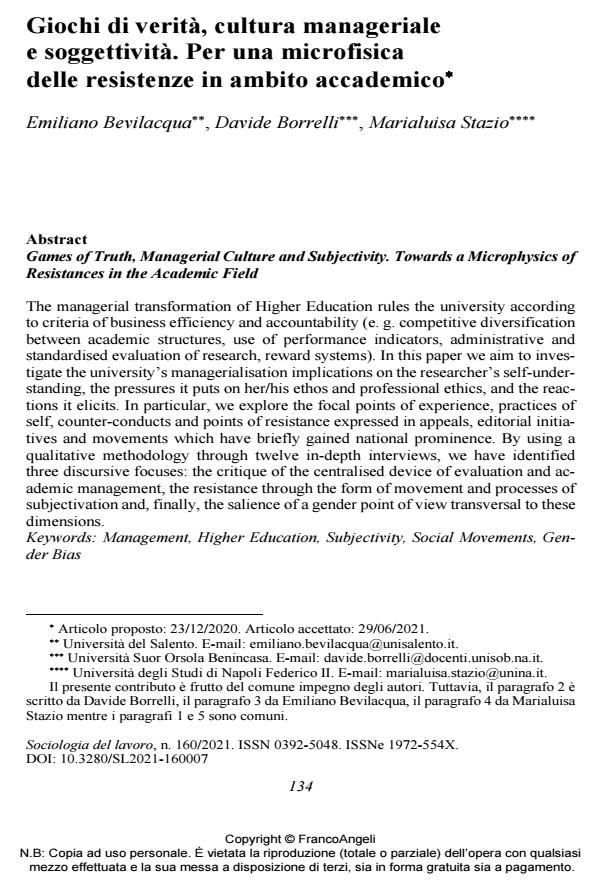Giochi di verità, cultura manageriale e soggettività. Per una microfisica delle resistenze in ambito accademico
Titolo Rivista SOCIOLOGIA DEL LAVORO
Autori/Curatori Emiliano Bevilacqua, Davide Borrelli, Marialuisa Stazio
Anno di pubblicazione 2021 Fascicolo 2021/160
Lingua Italiano Numero pagine 23 P. 134-156 Dimensione file 230 KB
DOI 10.3280/SL2021-160007
Il DOI è il codice a barre della proprietà intellettuale: per saperne di più
clicca qui
Qui sotto puoi vedere in anteprima la prima pagina di questo articolo.
Se questo articolo ti interessa, lo puoi acquistare (e scaricare in formato pdf) seguendo le facili indicazioni per acquistare il download credit. Acquista Download Credits per scaricare questo Articolo in formato PDF

FrancoAngeli è membro della Publishers International Linking Association, Inc (PILA), associazione indipendente e non profit per facilitare (attraverso i servizi tecnologici implementati da CrossRef.org) l’accesso degli studiosi ai contenuti digitali nelle pubblicazioni professionali e scientifiche.
Quando si parla di trasformazione in senso manageriale dell’istruzione superiore si fa riferimento a un complesso di innovazioni normative e organizzative - dalla diversificazione competitiva fra strutture accademiche all’uso di indicatori di performance; dalla valutazione amministrativa e standardizzata della ricerca al ricorso a sistemi di premialità - miranti a gestire l’università secondo criteri di efficienza aziendale e di accountability. Con il presente lavoro abbiamo inteso indagare le implicazioni che la managerializzazione dell’ambiente universitario genera nell’ethos del ricercatore, le pressioni cui sottopone la sua deontologia professionale e le reazioni che suscita. In particolare, la nostra ricerca ha inteso esplorare quei focolai di esperienze, di pratiche del sé, di contro-condotte e resistenze che si sono espresse in appelli, iniziative editoriali, movimenti che, a partire da una base locale, hanno conquistato per brevi periodi un rilievo nazionale. Seguendo una metodologia di tipo qualitativo e attraverso il ricorso alle interviste abbiamo individuato tre nuclei discorsivi: la critica del dispositivo centralizzato della valutazione e del management accademico, la resistenza attraverso la forma movimento e i processi di soggettivazione e, infine, la salienza di un punto di vista di genere trasversale ad entrambe queste dimensioni.
Parole chiave:management, istruzione superiore, soggettività, movimenti sociali, discriminazioni di genere
Emiliano Bevilacqua, Davide Borrelli, Marialuisa Stazio, Giochi di verità, cultura manageriale e soggettività. Per una microfisica delle resistenze in ambito accademico in "SOCIOLOGIA DEL LAVORO " 160/2021, pp 134-156, DOI: 10.3280/SL2021-160007